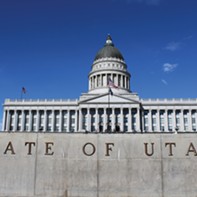After reading my shout-out in last month's Opinion piece ("Sex Ed," April 13), Utah State Sen. Todd Weiler, R-Woods Cross, tweeted me, "Nice article, except the parts where you completely misrepresent SB 185 and Utah's current sex ed curriculum." It turns out he didn't agree with some of my positions. He is personable, sure. He's been an on-air guest of Chelsea Handler and laughed off a ribbing from Stephen Colbert. He chairs or is on several Senate
Weiler: Regarding Bill 185 that just passed, I'm not trying to put any porn companies out of business. Bill 185 creates a cause of action that if a minor has been harmed by pornography, they, or their parents, could sue. It's like if your kid goes to McDonald's and orders Chicken McNuggets and finds there is glass inside. We're saying if the kid was harmed by a product and can prove the harm, then they can get damages. It's product liability 101. The second part of the bill creates a safe harbor, asking porn distributors to:
1. Make a good-faith attempt to verify the age of their consumers, and we already do this on vaping websites.
2. Make a simple warning that pornography may be harmful to minors.
If the pornography company does those two things, then they are immune from suit in Utah.
Me: My column was about moving sex ed into classrooms, not leave it to kids to find this information from magazines and online.
Weiler: There's a lot of misinformation about Utah's sex ed program. There are only 18 states that have comprehensive sex ed. The other 32 states, like Utah, don't. The main difference between comprehensive sex ed and abstinence-based—which is what the majority of states have—is that we do offer some information about STDs, but we don't go into a lot of information about birth control, condoms, etc. There is no data that shows that kids are looking at less porn if they have comprehensive sex ed. So that's the first part of my tweet.
I grew up in Illinois, and there are a lot of mixed feelings around the country about whether this is the government's responsibility, or parents responsibility, to teach kids about sex and how much information you provide. I mean, this is a concern all over the country. At the Legislature, we painfully reflect on the various opinions that are held in this state, and if we can throw the barn door open. If it's taught in schools, we might see
Me: A lot of the parents already self-select that anyway.
Weiler: A lot of parents self-select early grades and then they send their kids to HS. I'm concerned that, especially in
Me: So is there a point where Legislature is only respecting the wishes of parents who are against sex education in schools and not respecting the wishes of parents who are in favor of sex education in schools?
Weiler: I think parents can tell a child whatever they want. With sex ed, if that information is shared against the parents' wishes, you can't ever put that toothpaste back in the tube. And so, while I respect your question, I think there's a difference
Me: Respecting the wishes of some parents because you can't put the toothpaste back in the tube applies to co-educational sports, whether the earth is 5,000 years old or several billion. There are a lot of areas where there are cultural, or social or religious beliefs, or that we're teaching things that are different, whether it's global warming, dirty air or if Darwin was right. At some
Weiler: At the Legislature, we don't set curriculum, even in sex ed. We're not picking subjects. All of that's done by the state and local school boards. We do have a few local school districts that have decided to teach abstinence-only. But that's a local decision and I do believe in local control. And so, to answer your question, I think that is a local school board's decision as to where to draw the lines. Most of the lines are drawn at the local level. Right now the state law would prohibit teaching more than abstinence-based, but they can provide less if they choose to. In the 18 states where they teach about birth control, there is no data that shows there is less use of pornography than the teenagers in the states that don't have comprehensive sex ed.
Me: I stand by last month's column.
More by Stan Rosenzweig
-
Utah Political Lessons
Partisans fail to accept that we are each molded by the culture of our times.
- Nov 1, 2017
-
Worst Deal-Maker Ever
Wayward as some with a pedestal might act, they are part of our family we call America.
- Sep 13, 2017
-
Q&A With Rico Plautz
Local philanthropist and musician tells his story.
- Sep 6, 2017
- More »
Latest in Opinion
Readers also liked…
-
Russian Army Conscripts Asking, 'Where's Our Underwear?'
Smart Bomb: The completely unnecessary news analysis.
- Dec 21, 2022







